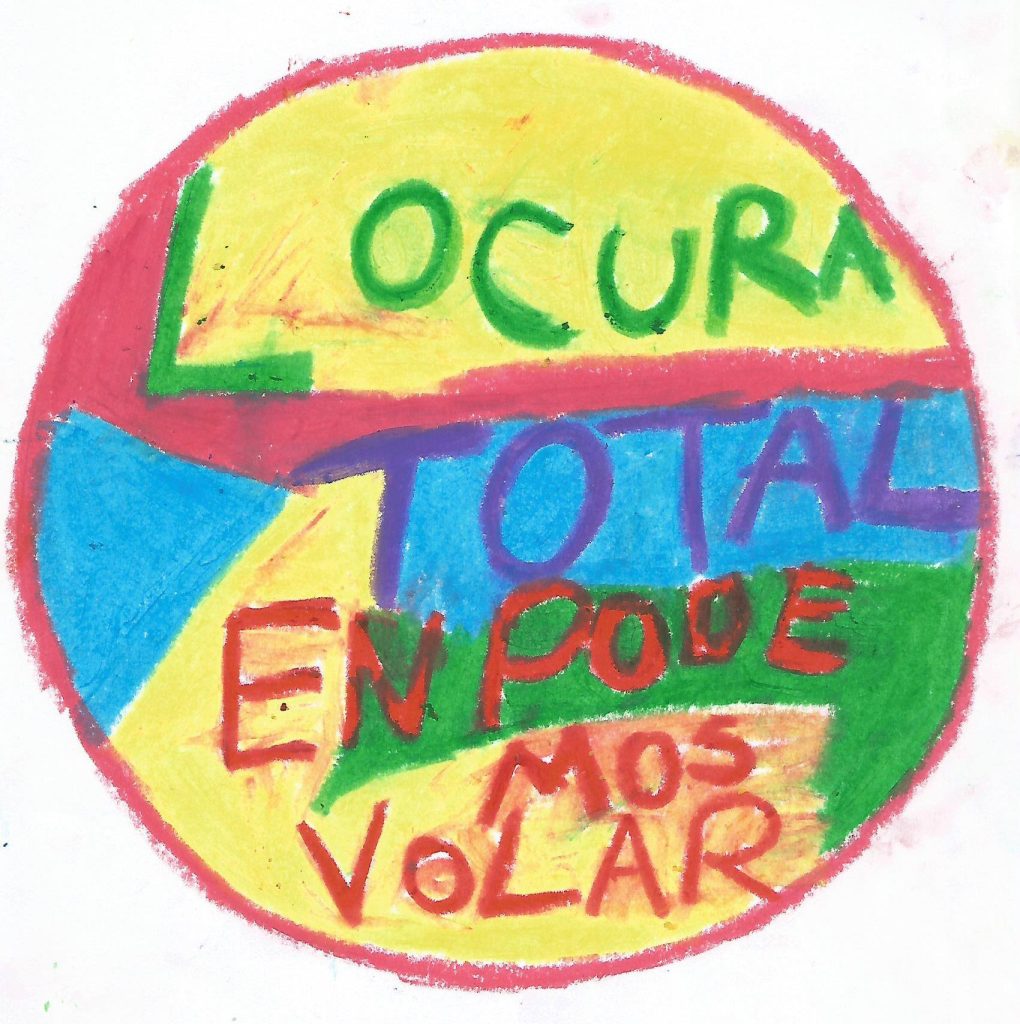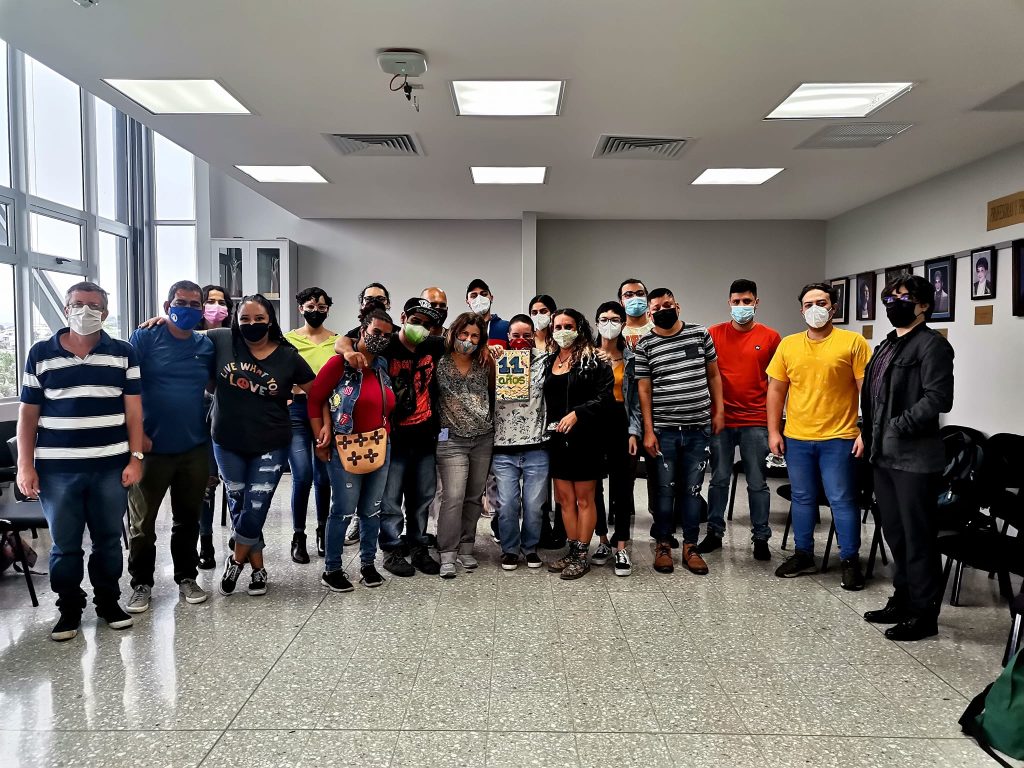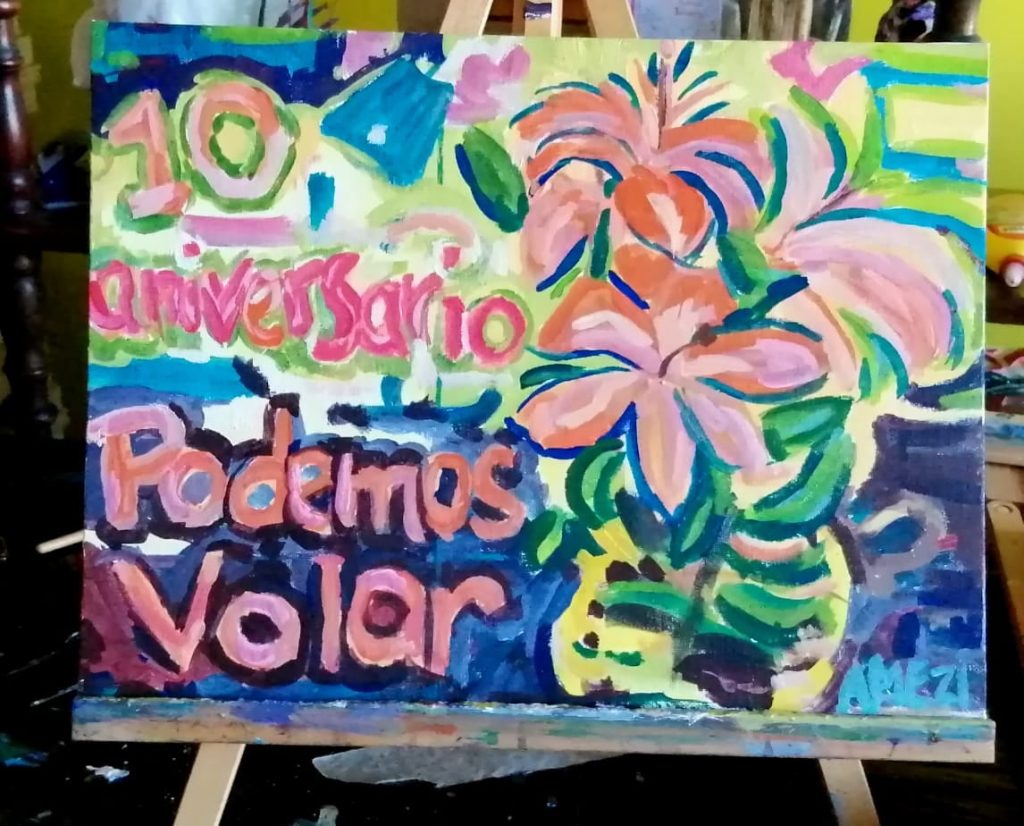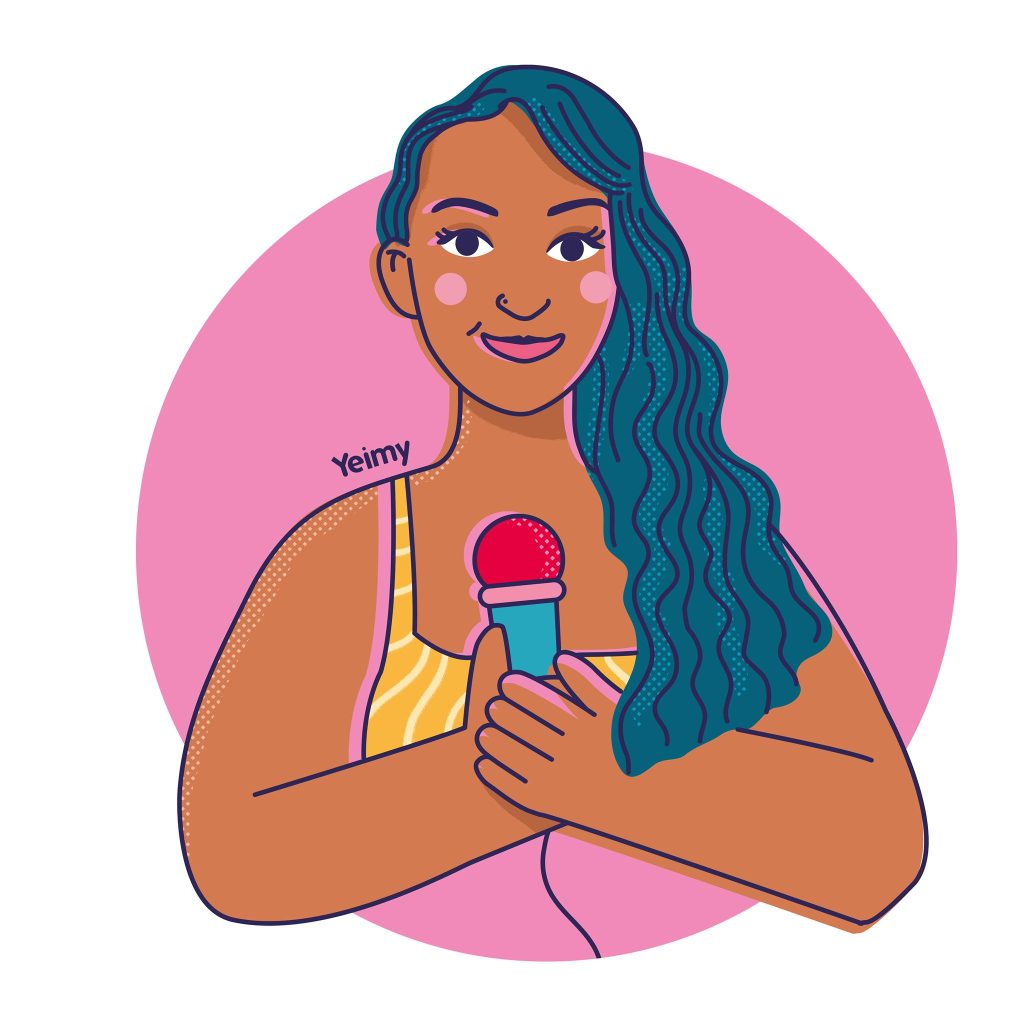What if a microphone were given to people whose voices we don’t normally hear? What if a radio program was broadcast from a psychiatric hospital?
Andrés Dinartes has spent years working to answer these questions. Since February 14, 2011, the psychologist has broadcasted the radio program “Podemos Volar” (“We Can Fly”) from Costa Rica’s National Psychiatric Hospital in Pavas, San José. This project—which he developed as a psychology student and now manages from his position as an interim professor at the University of Costa Rica (UCR) School of Psychology and Institute for Social Research—shares the perspective of psychiatric patients directly with the public. Andrés says that his goals include raising awareness about the human rights of patients undergoing treatment that, in his view, is outdated and obsolete.
As part of our June edition on mental health in Costa Rica, Andrés spoke with El Colectivo 506 via Zoom about the history of his initiative; the National Mental Health Policy 2012-2021, and the Mental Health Law now under consideration in the Legislative Assembly; and what he considers should be the future of Costa Rica’s Psychiatric Hospital. The conversation has been edited for brevity and clarity.
How was “Podemos Volar” born, and what are the program’s goals?
My classmate Adrián Solís and I first created the project when we were psychology students. We were finishing our five years of studies; I was very disappointed, because I knew that I liked clinical psychology, but most of my professors had gone into private practice. Psychology in Costa Rica and, in general, the approach to mental health here is very institutionalized, very focused on the attention given in psychiatric hospitals. This is obsolete, so I was not comfortable with that format either.

We created a third way, so to speak, which was to propose this radio project within the Psychiatric Hospital. It would give a voice to some of the people who receive care there. We started to work on an initial document in 2010. Then we took that document to the hospital. I had done my internship in the crisis intervention module there, so there were supervisors that I knew, and we initially presented our project to one of them. We kept working our way up the ladder for a year, talking with everyone at the hospital, and after that year the hospital asked us for a demo.
On the patient side, who participates in the radio program?
The hospital has always opened the doors of its day service for us. These are people who go to workshops at the hospital during the day, and then return to shelters or to their homes. However, the hospital has never allowed us to record people who are hospitalized. That has been a divergence between the hospital and the project, because obviously we believe that—here as in other parts of the world—people who are hospitalized should still have the opportunity to record. But the hospital doesn’t see it that way.
The project has continued growing ever since we first went on the air. Obviously there are always some difficulties to face, especially related to the asylum model, which does not understand the need to experience human rights within these institutions. Fortunately, the project has generated more awareness around the issue. Before, the issue was relegated to the sidelines. It has definitely been gaining momentum, also because mental health needs are becoming more obvious in this country in general.

How is the project financed?
At the beginning, the financing was obviously nothing more than the precarious resources of two students. Fortunately, once we received permission from the hospital, we received the support of the Radios [UCR]. They provided the space on the radio and the radio technicians—and two years later the university, also through the School of Psychology, turned it into a project of the Vice-Rector for Social Action. Then it became a University Community Work project, which means that students can apply community service hours to the space. That has created a rich environment, because there are medical students, engineering students, dance students, and art students within the project.

How have people within the hospital reacted to the project?
There is a power dynamic between users [patients] and hospital staff. There are some [users] who don’t want to risk embarrassing the staff by participating in the space. There are also staff members who love the project, which seems very valuable, but there are others who do not think it is valuable and do not like what the project does.
The project has always been clear about the defense of human rights within these spaces. At some critical moments, the program has supported the users and has not bowed down to the institutional vision of these issues. An example of this was last year when there were very serious complaints of human rights violations inside the hospital, and we did two hours of “Podemos Volar” dedicated exclusively to these testimonies. Obviously the hospital did not like that we did that kind of programming. That’s been part of the tension within the space.
After hearing all that, I think my question should actually be: how is it that you’re still allowed in there?
I believe that what has happened with hospital leadership is that they don’t dare close down the project, because they know that this would show that they do not have a respectful vision of human rights. The project has gained relevance; validation has come from outside, from the university, from organizations. When we’d been on the air only seven months, the Ombudsman’s Office gave us an honorable mention in the Quality of Life Improvement Award. That was an important moment, and the project has grown from there.
You talk about the transformation that you want to see in the hospital. What does that transformation look like?
Since 1990, Costa Rica has been committed to the Caracas Declaration, an international declaration issued by the Pan American Health Organization, the Regional Office of the World Health Organization. That declaration states that psychiatric care must be participatory, decentralized, respectful of human rights, that it must take place in communities—and that care based on psychiatric hospitals is completely contrary to those objectives.
In addition, it says that psychiatric hospital-based care has a number of huge problems, because, for example, it uproots people from their communities, giving completely centralized care. In Costa Rica, people from Guanacaste or Limón have to come to San José for specialized care. This is a huge mistake.

Another issue that the Caracas Declaration points out is that a lot of money is invested in these centralized services, and therefore resources cannot be allocated for services outside of San José.
Finally, the Psychiatric Hospital is a teaching hospital. So many people are trained in psychiatry, in the hospital, based on that model—so the model reproduces itself.
The Caracas Declaration is three pages long. There is no mystery around how to understand that statement. Costa Rica has been internationally committed for 32 years to make these changes, and we have not seen anything. That also tells us that we have spent 32 years being completely obsolete in mental health care.

We [at “Podemos Volar”] in no way argue that the hospital has to be closed tomorrow. If we closed hospitals, many people who require care would not have it. What we demand is that if we committed ourselves 32 years ago to providing care in the community, where is that network of services that should exist so that we do not depend on the psychiatric hospital? There are only a few small half-created modules during these 32 years.
This strong mental health care network must be created, and it must be evaluated, too. Only then can a closure of psychiatric hospital take place. Most likely, this could take five to seven if done in an effective and well thought out way. But if we don’t start today, we’re going to spend another 32 years saying “We didn’t do it, we didn’t do it, we didn’t do it”—and as current rates of mental health care point out, people are going to continue to die. People will continue to suffer because their mental health care is not effective.
If this closure took place, would the people who do require 24/7 care be accommodated within the hospitals?
National hospitals, yes. If someone requires specialized services in Costa Rica, cardiology for example, there are cardiology units in the Hospital Mexico, in the Puntarenas Hospital, in the Limón Hospital. [But] we have sent people who need mental health care exclusively to Pavas.
The 2012-2021 National Mental Health Policy talks about creating that community network that you describe. Do you believe the policy has remained completely on paper?
In its conception, that policy was already conservative, because at no time does it question care in psychiatric hospitals. It’s based on the idea that psychiatric hospitals will continue to exist. In the [recent] pronouncement that we made on the Mental Health Law, we raise that question.
The problem in Costa Rica is even broader than just policies. It is a professional culture of psychiatrists and psychologists who have been trained in a certain way of understanding mental health that is completely dependent on psychiatric hospitals. The people who drafted the National Mental Health Policy, the people who had the opportunity to participate in the National Mental Health Law, are people who were trained under that model. So they can’t imagine what it’s really like to create a mental health care network.

The Comptroller General of the Republic issued a report in 2018 on the National Mental Health Policy and clearly stated that many of the actions of that policy were completely unfinished. It is the 2012-2021 Policy; it was supposed to be updated last year. It was not updated, right? So I think that speaks to the little importance that we really give to mental health. (Read more on the Comptroller’s report and the status of the Mental Health Policy in El Colectivo 506.)
Most of the reforms in mental health [in other countries] have come about because the social sector makes demands of authorities. Here in Costa Rica, unfortunately, organizations linked to mental health have been very submissive to professionals.
Culturally, Costa Rica has this imaginary vision that it is a country of peace, although Costa Rica is very violent. This imaginary peace implies that people do not organize themselves, do not demonstrate, do not express their discontent in an organized way. And there is a kind of respect, an inability to be able to question professionals.
There is this vision in Costa Rica that the patient has to be the calm one, the one who behaves well, the one who does not complain—the one who, when a psychologist or a psychiatrist tells him something, has to listen, remain silent and accept. At “Podemos Volar,” we do just the opposite. Patients have the right to be angry. They have the right to say what they think. They don’t have to accept everything [professionals] say.

So, what’s next?
We have enormous shortcomings and enormous difficulties. It will not be easy. But we appeal to an effective right to mental health. Because if you go now to ask the public health care system [Social Security System, or Caja, for a mental health appointment], they will give you an appointment for a year from now, or even two years. And no: attention has to be right away. If you need attention, it has to be now.
With the Mental Health Law, we are organizing actions to go and deliver [our position] to each of the offices of the legislators so that they can be informed. We are going to oppose it.
We are surprised that there is so much silence and passivity on the part of many organizations regarding this issue. An attempt was made to pass a reform to Law 7600, which governs the most important aspects of disability in Costa Rica, and many organizations opposed this reform precisely because they had not been properly consulted. I think that the physical disability sector is very well organized. On the other hand, everything that has to do with psychosocial disability, which includes this entire topic of behavioral disorders, is not so organized.
We are eager for other people to join in this effort.






